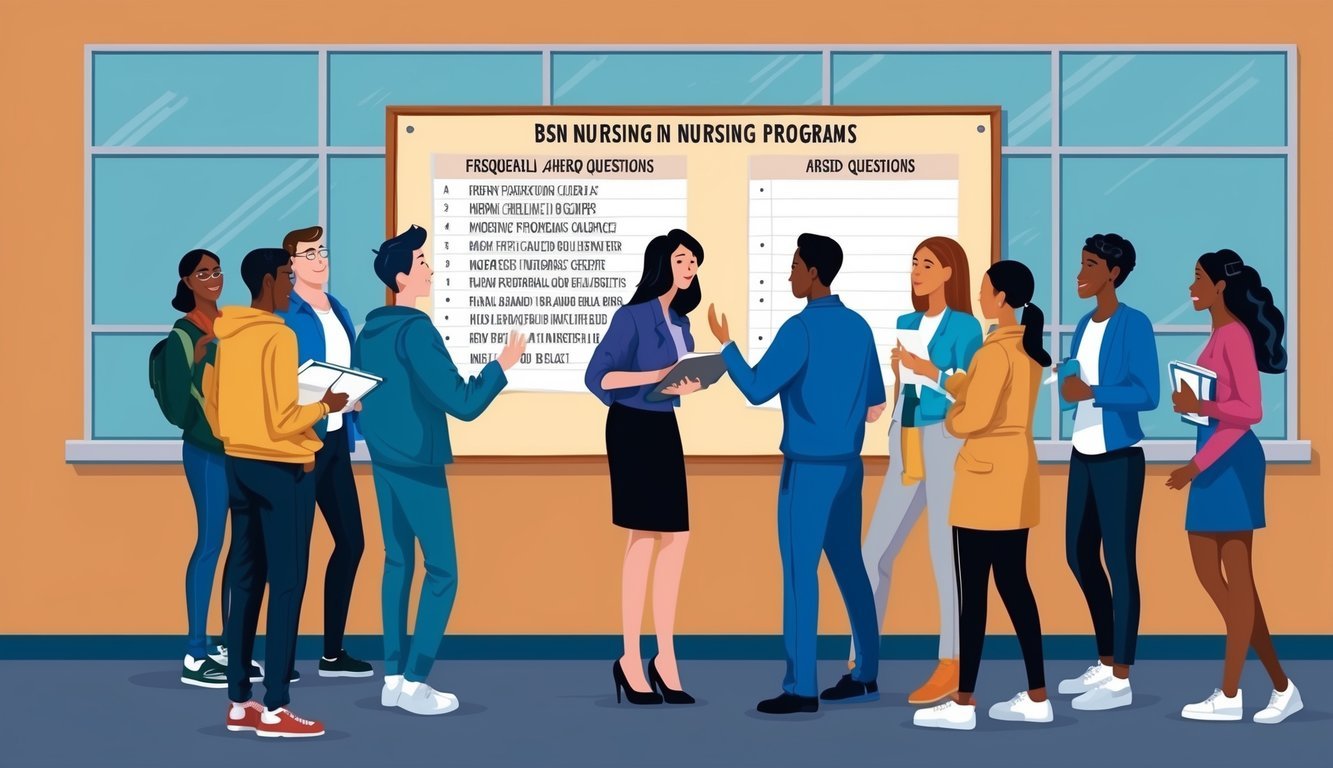Nursing is a rewarding career that offers numerous opportunities for growth and advancement.
If you’re considering a career as a Registered Nurse (RN) in California, enrolling in a Bachelor of Science in Nursing (BSN) program is a key step.
A BSN not only enhances your nursing skills but also improves your job prospects, as many employers in California prefer candidates with this degree.
California has several accredited BSN programs designed to equip you with the knowledge and training needed to thrive in the nursing field.
These programs typically cover essential topics, preparing you for both the NCLEX-RN exam and a successful nursing career.
Many schools offer flexible options, including traditional, online, and hybrid formats, making it easier to achieve your educational goals.
As you explore BSN programs, consider how these degrees can influence your future in nursing.
You’ll find that they open doors to leadership positions and specialized nursing roles, helping you build a fulfilling career that makes a difference in patients’ lives.
Key Takeaways
- BSN programs enhance your nursing skills and job prospects.
- California offers various accredited options to suit your needs.
- A BSN can lead to advanced career opportunities in nursing.
Understanding BSN Programs
BSN programs are an important step for those looking to become a registered nurse (RN).
They provide the educational foundation necessary for a rewarding career in nursing.
Below are critical aspects of BSN programs that will help you make informed decisions.
Bachelor of Science in Nursing Overview
A Bachelor of Science in Nursing (BSN) is a four-year degree that prepares you for a career as a registered nurse.
This program covers essential topics such as anatomy, physiology, and nursing ethics.
You will also engage in clinical training, where you gain hands-on experience in healthcare settings.
This practical experience is vital for applying what you learn in class to real-world situations.
Many BSN programs also offer specializations, allowing you to focus on areas like pediatrics or emergency care.
BSN vs. ADN
When choosing a nursing path, you will encounter two main degree types: BSN and Associate Degree in Nursing (ADN).
| Degree | Duration | Career Opportunities | Salary Potential |
|---|---|---|---|
| BSN | 4 years | Greater advancement options | Higher average salary (up to $125,350) |
| ADN | 2 years | Basic nursing roles | Lower average salary (around $80,000) |
BSN graduates typically have access to more job opportunities and advancement prospects compared to those with an ADN.
A BSN is often required for management positions and specialized nursing roles.
Advancing from RN to BSN
Many registered nurses choose to advance their careers by enrolling in RN to BSN programs.
These programs build upon your existing nursing experience and education, allowing you to complete a BSN in a shorter time frame, usually 1-2 years.
Coursework covers advanced nursing practices and leadership skills.
You will also participate in clinical training, which is essential for applying advanced concepts.
Completing a BSN can significantly enhance your career options and earning potential.
With ongoing demand for educated nurses, this degree can pave the way for various roles in healthcare.
Accredited Nursing Programs in California

California is home to many accredited nursing programs that prepare students for successful careers in nursing.
Understanding the available programs and their accreditation is vital for making an informed decision about your education.
California State University Nursing Programs
The California State University (CSU) system offers a variety of nursing programs that lead to a Bachelor of Science in Nursing (BSN).
Notable campuses include:
| University | BSN Program Details |
|---|---|
| San Diego State University | Offers a traditional BSN program with strong clinical training. |
| California State University-San Marcos | Provides a comprehensive BSN program emphasizing patient care. |
| San Jose State University | Features a rigorous BSN program with high NCLEX pass rates. |
| California State University-Chico | Offers a BSN program focusing on diverse nursing specialties. |
| California State University-Sacramento | Includes a well-rounded BSN curriculum with extensive hands-on experience. |
To enroll in these programs, you must meet specific prerequisites and apply through each university’s admission process.
Each program is designed to ensure you receive quality education and clinical experience.
CCNE Accredited Institutions
The Commission on Collegiate Nursing Education (CCNE) provides accreditation to institutions based on their nursing programs’ quality.
Programs accredited by CCNE meet strict standards, which are essential for providing students with a robust education.
Some CCNE accredited nursing programs in California include:
- California State University-San Marcos
- San Diego State University
- San Jose State University
It’s crucial to choose programs accredited by CCNE because this recognition can enhance your employment opportunities and ensure that your education meets industry standards.
For more information, check the CCNE website to find a comprehensive list of accredited programs in California.
Admission Requirements and Application Process
Understanding the admission requirements and application processes for BSN programs in California is essential.
Each program has specific criteria based on the type of BSN you are pursuing.
Entry-Level BSN Admissions
For entry-level BSN programs, you typically need a high school diploma or GED.
Most programs require a cumulative GPA of at least 2.75.
Additional requirements often include:
- Clear criminal background check
- Drug screening
- Completion of prerequisite courses in subjects like biology and chemistry
You will need to submit an online application along with your transcripts and any required letters of recommendation.
Some schools may also require a personal statement or interview.
For more details, visit 10 Best Accredited BSN Programs in California.
Accelerated BSN Prerequisites
Accelerated BSN programs are designed for those who already hold a bachelor’s degree in another field.
To apply, you typically need to meet these criteria:
- Earned a previous bachelor’s degree
- Minimum GPA, often 3.0 or higher
- Completion of specific prerequisite courses within a set time frame
Common prerequisite courses include:
- Anatomy and Physiology
- Microbiology
- Statistics
After meeting these requirements, you can begin your application process.
Make sure you gather your transcripts and prepare any additional documents required by the program.
More information can be found at CSULB BSN Program.
RN-to-BSN Admission Criteria
If you are a registered nurse (RN) looking to achieve a BSN, you will need specific qualifications and criteria to be eligible for RN-to-BSN programs.
Requirements typically include:
- Valid California RN license
- Graduation from an accredited Associate Degree in Nursing (ADN) program
- An overall GPA of 2.5 in nursing courses, with no grade lower than a C
You can apply online, providing your RN license number, transcripts, and proof of your ADN education.
This pathway allows busy nurses to enhance their careers with a BSN degree.
Learn more about the program at RN – BSN Online Program – California State University Long Beach.
The California Nursing Career Landscape

In California, nursing offers a robust career outlook with many opportunities.
Understanding the job market, salary expectations, and advanced roles can help you navigate your nursing career effectively.
This section covers key areas that are essential for aspiring and current nurses in the state.
Job Market and RN Salaries
The job market for registered nurses (RNs) in California is strong.
With over 160 nursing schools, the state produces a significant number of new RNs yearly.
According to the U.S. Bureau of Labor Statistics, the average annual salary for RNs in California is around $137,690, considerably higher than the national average of $94,480.
| Position | Average Salary |
|---|---|
| Registered Nurse | $137,690 |
| Nurse Practitioner | $107,310 |
| Advanced Practice RN | $140,000+ |
This high demand is driven by an aging population and the need for healthcare services.
Job growth for RNs is projected to remain above average, ensuring a stable career path.
Nursing Specializations and Advanced Roles
Nursing offers numerous specializations and advanced roles that enhance your career potential.
Areas such as public health, neonatal nursing, and mental health nursing are in high demand.
Advanced roles include becoming a Nurse Practitioner (NP) or pursuing an Advanced Practice Registered Nurse (APRN) designation.
Specializing can lead to increased responsibilities, better job prospects, and higher salaries.
For example, NPs often earn more than $107,000 annually, depending on their field.
Continuing Education and MSN Options
Continuing education is vital for career advancement in nursing.
Obtaining a Master of Science in Nursing (MSN) opens doors to leadership positions and specialized roles.
Programs are widely available across California and cater to different interests, such as education or administration.
You can also pursue certifications, like the Public Health Nursing Certification, to expand your skills and marketability.
Many MSN programs offer online courses, making it easier to balance work and education.
Continuing your education can significantly increase your earning potential and career stability.
Preparing for the NCLEX-RN Exam
Successfully passing the NCLEX-RN exam is crucial for your nursing career.
It requires focused preparation strategies, a clear understanding of the exam format, and familiarity with state pass rates to gauge your readiness.
Test Preparation Strategies
Effective preparation is key to passing the NCLEX-RN exam.
Start by creating a tailored study plan.
This plan should include:
- Daily Study Goals: Set specific topics to cover each day.
- Practice Questions: Use NCLEX-style questions to familiarize yourself with the format.
- Timed Practice Tests: Simulate exam conditions to improve your time management.
Additionally, be sure to give yourself breaks.
Using materials from various resources can help reinforce concepts.
Consider joining study groups or online forums to discuss challenging topics.
This collaboration can help clarify misunderstandings.
Understanding the Exam Format
The NCLEX-RN examination is a computerized adaptive test.
This means the questions adjust based on your answers.
The format can make the test feel more personalized.
You will receive between 75 to 265 questions.
The number depends on how well you are answering them.
The test covers various topics including:
- Safe and Effective Care Environment
- Health Promotion and Maintenance
- Psychosocial Integrity
- Physiological Integrity
Take time to understand each category, as they represent different areas of nursing knowledge and practice.
Familiarizing yourself with the question types, such as multiple-choice or select-all-that-apply, is essential for success.
California NCLEX Pass Rates
In California, the pass rate for the NCLEX-RN can vary by program.
Recent data shows the average pass rate for first-time test takers is around 85%.
Here is a breakdown of pass rates for some top nursing programs in California:
| Nursing Program | Pass Rate (%) |
|---|---|
| CSU-Stanislaus | 92% |
| UCLA | 90% |
| University of San Francisco | 88% |
These statistics are provided by the California Board of Registered Nursing, which monitors licensing exam performance.
By knowing these figures, you can assess which programs may offer the best preparation.
This can also motivate you to maintain a strong study regimen throughout your nursing education.
Frequently Asked Questions

This section provides specific answers to commonly asked questions about BSN nursing programs in California.
You will find critical information regarding enrollment requirements, institution options, program formats, and how to manage waiting lists.
What are the requirements for enrolling in BSN nursing programs in California?
To enroll in a BSN program in California, you generally need to fulfill several requirements.
Most programs require:
- A high school diploma or equivalent
- Completion of prerequisite coursework, often including subjects like biology, chemistry, and mathematics
- A minimum GPA, usually around 2.5 or higher
- A passing score on the TEAS (Test of Essential Academic Skills) or similar assessments
For specific details, check resources like the California State University system BSN FAQ.
Which institutions offer the best BSN nursing programs in California?
Several well-regarded institutions in California offer BSN programs.
Notable universities include:
| Institution | Location |
|---|---|
| California State University, Long Beach | Long Beach |
| California State University, Fullerton | Fullerton |
| University of California, Los Angeles | Los Angeles |
| San Diego State University | San Diego |
These schools have strong nursing programs with varying focuses and formats.
Can you complete a BSN nursing program online in California?
Yes, some institutions in California offer online BSN programs.
These programs typically cater to working professionals or those who prefer a more flexible learning format.
You can find programs at schools like CSU, Bakersfield, which provides a RN-BSN Completion program.
Are there any accelerated BSN nursing programs in California for quicker graduation?
Accelerated BSN programs are available in California for those who already hold a bachelor’s degree in another field.
These programs allow you to complete your nursing degree in a shorter time, often within 12 to 18 months.
For example, check out programs offered by universities like California State University, Los Angeles.
What private nursing schools are available in California for a BSN degree?
California has several private colleges that offer BSN degrees.
Some notable options include:
| Institution | Location |
|---|---|
| Mount Saint Mary’s University | Los Angeles |
| University of San Francisco | San Francisco |
| Azusa Pacific University | Azusa |
These institutions provide various BSN pathways tailored to different student needs.
How do RN programs in California address the waiting list issue for prospective students?
RN programs in California often have long waiting lists due to high demand.
Many schools are working to address this issue by expanding their class sizes and offering more flexible scheduling options.
Institutions like CSU Fullerton provide clear communication about waiting lists and alternative pathways.
This helps you stay informed about your application status.

